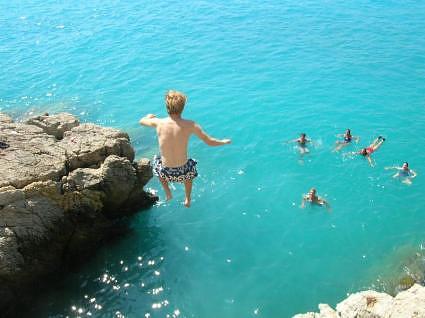It was 38 degrees in the shade as we walked through the centre of town. The main street was almost empty as people chose to walk down side streets that offered shade from the searing summer sun. In fact wherever you walk you are looking for shade where you can escape from the intense heat of summer.
The summer heat in Europe is an issue that you must be prepared to cope with in the same way as you learn to cope with the freezing temperatures of winter. I’ve just returned from escorting a three week tour from Paris through to Dubrovnik in Croatia. One day it was just under 40 degrees but yesterday I arrived home back to New Zealand where the temperature was minus four degrees on arrival!
The heat in Europe especially became an issue in 2003 when an unprecedented heat-wave swept Europe from early June onwards, resulting in over 2000 deaths in France alone. France subsequently set up a warning system for the dangers of excess and continual heat in the summer. The French utilise a four level warning system which begins with a green category, through to yellow, orange, and finally a red grading (for the most extreme conditions). These gradings are regularly broadcast through the news media. Last week in France there were six departments that were placed on an orange alert. For each grading level the local authorities have prescribed procedures to adhere to involving distributing drinking water and checking old peoples’ homes and hospitals, and encouraging local communities to check neighbours etc.
France benefits from the stability of a continental climate, unlike island nations like United Kingdom and New Zealand, and as such once the summer arrives (May/June) the weather remains relatively stable through until the end of summer (August/September). Temperatures regularly remain around 25 to 30 degrees, with early August temperatures being often much higher. I have strong memories of the heatwave of 2003, where temperatures at 11pm were still sitting at about 32 degrees – even now in July there are often minimum temperatures at night of about 25 degrees.
Despite these warm temperatures air conditioning of homes is not so common. Temperatures within a home are usually controlled through careful use of shutters and air control through a house. I remember staying in a hotel in Corsica on an escorted tour of mine. This beach-front hotel didn’t have air-conditioning, but it offered many advantages despite this. On arriving at this Propriano hotel on a stinking hot summer day I was shown to my room, and on entering the room I noticed how cool it was so congratulated the manager on installing air-conditioning, only to be told that no air-conditioning had been installed! They controlled the temperature purely with the clever use of shutters and by closing and opening windows when the breeze and conditions were suitable.
Although we were on tour through the heat of summer, a large majority of people we saw were Europeans on their summer holidays, and from the Adriatic Sea in Croatia through to the Cote d’Azur in France hordes of people right now are simply wallowing in the 26 degree sea water of the Mediterranean – that’s one way to handle the lovely hot temperatures. Schools of human whales everywhere in their speedos – what is it about the Europeans and their speedos!!
So if you have the luck of traveling through France over the summer months enjoy these wonderful warm temperatures, but remember to always carry water with you (and drink it!), try and keep in the shade or in a pool for the hottest periods of the day (12pm to 4 pm) and practice that important art of “walking in the shadows”.
Happy Summer Holidays!


Leave a Reply